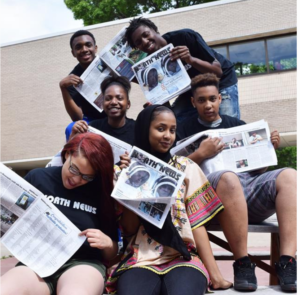Building Community Through Journalism: A Conversation with Adair Mosley
Pillsbury United Communities works to create social change in Minneapolis through an array of interconnected programs, neighborhood centers, and supports. Notably, Pillsbury, which began operations with Minneapolis’ first settlement house in 1879, has placed an increasing emphasis on storytelling to help lift up the experiences of those it serves and allow communities to shape their own narratives. Spotlight recently spoke with Adair Mosley, president and CEO of Pillsbury United Communities, to talk about the work of Pillsbury and how it is using journalism and storytelling to further its mission. The conversation has been lightly edited for length and clarity.
Tell more about the work of Pillsbury and the history behind it?
The Pillsbury Settlement House is in its 140th year. In the current moment, we are asking ourselves what a 21st settlement house looks like? What does justice look like to close racial disparities and disparities in economic power? We believe systemic problems cannot be solved by one tactic or action; we need a macro level view. And our work needs to move at the speed of community. Our approach focuses on three things: people, place, and prosperity.
We have always taken a holistic approach to solving complex issues. It’s based on the idea that communities should develop their own solutions and we need to remove barriers that prevent the realization of these solutions. We’re meeting needs around issues like food insecurity and youth and family development through centers that are designed to feel like an extension of the individual’s home.
You really emphasize the communal nature of this work.
Yes, our centers are embedded within communities and take on the values and personality of the place. Communities served vary widely from largely African American areas, to heavily Latino areas, to immigrant communities.
Can you talk more about some of the specific services provided through this work?
We’re serving individuals and families across a wide array of needs. We have a holistic conception of health that extends far beyond the doctor’s office to the entire lived environment. We’re working on chronic disease management, ensuring healthy food access, regular attendance in school, crises management, and much more. We also want to foster a sense of belonging and are using tools like community art projects and neighborhood beautification efforts to create a sense of place.
What is the media work you are doing and how does it fit into these broader efforts?
We have our own mini media empire that include a radio station, theatre, and newspaper to elevate community voice. Communities need to be able tell their own story as a true and authentic representation of who they are. We are empowering neighborhoods to drive the agenda of what’s important to them.
A radio station is a pretty unique service.
They have come to us in different ways. We have had the theatre since 1992. More recently, we acquired the community newspaper and were awarded a low-power radio station a few years back. The radio has a significant amount of native and indigenous programming with a diverse range of voices being represented. Communities have the chance to talk about issue of particular internal importance.
It’s run by a might crew of one, who handles radio station management and cultivating new personalities and people to host shows. And then there is a robust team of volunteers who help out and host their own shows.
And how does the newspaper work?
We’re in the third year of operation. We acquired North News, which has served the North Minneapolis community for over 25 years. It came to us because the owner was looking to sell it and we were thinking of news way to shape narratives. We have had tremendous success telling the stories of the North Minneapolis community.

Students with the North News paper
There is a full-time staff with an editor, two staff writers, and partnerships with two local high schools where children have the chance to curate stories about issues important to them.
What are some examples of previous stories?
There’s been a host of different stories. There’s been things around drug use and violence from the perspective of youth. We did a whole series that was youth lead around trauma and what is the lived experience of kids whose communities are under siege. We produced a wonderful spread that talked about their experiences with that.
What we’ve heard is people say they feel a real ownership over this and that we are capturing the authentic voices of the community.
What’s next for this work?
We want to continue being able to tell a collective narrative. We’re looking to expand opportunities for participation in these programs, since regardless of whether you go into journalism there is value in being able to tell a story.
We’re also looking to build more partnerships with mainstream media; whether it’s local radio or print publications like the Star Tribune. These places are realizing they can do a better job telling more local and more authentic stories. We want to create more opportunities to expand our audience and share out these stories.
Adair Mosley serves as the president and CEO of Pillsbury United Communities.
